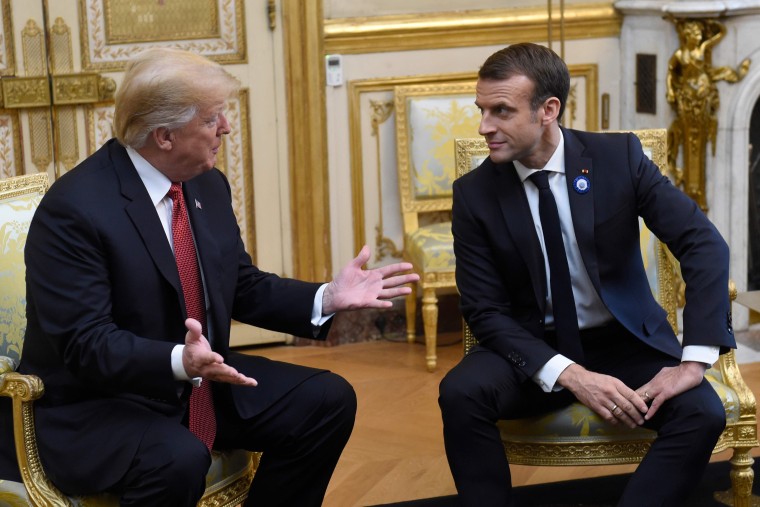PARIS — President Donald Trump met with French President Emmanuel Macron on Saturday amid new tensions in one of the closest relationships he’s forged with a world leader since taking office.
On the eve of their meeting at the Élysée Palace, Trump criticized Macron’s pitch for hardening European defenses to protect the continent from countries including the U.S. as “insulting.”
The president also decided not to attend a peace conference Macron is hosting in Paris this weekend, where world leaders are gathering to commemorate the 100th anniversary of the end of World War I.
But on Saturday morning the pair tried to paper over their differences, with Macron attempting to more clearly explain his vision of a new European army and Trump stressing their friendship and shared positions on “burden sharing” for NATO countries.
Macron called Trump “my good friend” and even squeezed Trump’s knee at the end of their remarks to reporters, a gesture reminiscent of the bromance that’s defined their relationship.
“We have become very good friends over the last couple of years,” Trump said of Macron. “We’re very much similar in our views.”
Macron said his vision of a stronger European defense is intended to ease the burden on the U.S. because “it’s unfair to have the European security today being assured just by the United States.”
“That’s why I do believe that we need more European capacities, more European defense, in order to take this part of the burden,” Macron said. “When President Trump has to protect or to defend one of the states of the United States, he doesn’t ask France or Germany, or another government of Europe to finance it.”
Trump has targeted the issue of European countries increasing their defense budgets as members of NATO since he campaigned for the presidency. It’s been one of the leading points of tension in his administration’s relationship with the continent.
“We want to help Europe but it has to be fair,” he said Saturday. “Right now, the burden-sharing has been largely on the United States.”
Macron is one of the few European leaders who managed to develop a bond with Trump. He hosted the president in Paris last year for France’s Bastille Day celebration, and Trump feted Macron with the only state dinner he’s held during his nearly two years in office.
But the limits of those efforts have begun to show.
Trump’s decision not to attend Macron’s peace conference, for instance, is seen not only as a snub but also a “sign of the man who is not interested in peace,” said François Heisbourg, a former campaign adviser to the French leader who is now the director of a defense think tank in Paris.
“The fact that the president, the American president, will be the only one who doesn't stay on for what we call the peace forum, which all of the other heads of state will participate on Sunday afternoon, is a really strange symbol,” Heisbourg said. “That's going to hurt badly.”
Other world leaders in Paris this weekend, including Russian President Vladimir Putin, plan to attend.
The question of whether Trump and Putin will have a discussion during the events in Paris, including a dinner Saturday night and a lunch on Sunday, looms over the weekend. There is no meeting scheduled between the U.S. and Russian leaders, who are expected to hold a formal sit-down later this month while they’re both in Argentina for a global summit.
Beyond European defense, Trump and Macron were set to discuss an array of economic, foreign policy and security issues. Macron said their talks would focus on trade, climate change, threats from Iran and the conflicts in Syria and Yemen. Trump said terrorism would be a significant topic in their meeting, and that he hoped to advance discussions on trade.
“We’ll see if we can get it over the line, as they say,” Trump said.
Macron said France is committed to increasing its defense budget. His comments seemed aimed at repairing any damage caused by his remarks a day earlier about protecting Europe from the U.S. while discussing cyber security and global instability.
Just before arriving in Paris Friday night, Trump made clear how he interpreted what Macron said.
“President Macron of France has just suggested that Europe build its own military in order to protect itself from the U.S., China and Russia,” Trump wrote on Twitter. “Very insulting, but perhaps Europe should first pay its fair share of NATO, which the U.S. subsidizes greatly!”
Trump’s visit to Paris is his first trip outside of the U.S. since Tuesday’s midterm elections in which Democrats won control of the House and Republicans held the Senate.
He decided to attend the World War I commemoration after his plans for a military parade in Washington this weekend were derailed because it was estimated to cost more than $90 million. He had called the celebration of Armistice Day a “parade,” though it’s actually a series of events including a ceremony at the foot of the Arc de Triomphe on Sunday.
In general, the theme Macron adopted for the weekend — international cooperation and the value of alliances — runs counter to Trump’s “America First” world view, and the city is expecting protests on Sunday against the U.S. leader’s policies.
Yet another group of protesters in Paris are demonstrating because they agree with Trump. The Accidental Americans Association in France is organizing a protest of America’s policy of automatically granting citizenship to anyone born in the U.S. The group wants its members’ U.S. citizenship to be removed, saying America’s policy forces them to pay additional taxes on their French revenue.
Trump has said he wants to reverse the U.S.’s so-called birthright citizenship policy.





